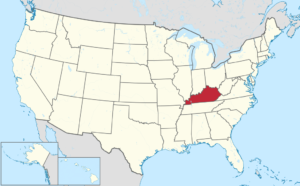 Kentucky, the bluegrass state, has a moderate temperature that does not get too cold in the winter or too hot in the summer. Consistent solar energy from the sun will vary in different parts of the state. Nevertheless, Kentucky is well-suited for future solar energy panel increases.
Kentucky, the bluegrass state, has a moderate temperature that does not get too cold in the winter or too hot in the summer. Consistent solar energy from the sun will vary in different parts of the state. Nevertheless, Kentucky is well-suited for future solar energy panel increases.
Kentucky offers some excellent incentives, such as the rebates from the Tennessee Valley Authority for solar installations.
Contents
- 1 Key Takeaways
- 2 Kentucky Solar Potential
- 3 Solar Panel Benefits
- 4 Kentucky Solar Zoning Ordinance
- 5 Net-Metering Decisions
- 6 Renewable Portfolio Standard
- 7 Case Study: Residential Solar Installation in Lexington, Kentucky
- 8 Expert Insights From Our Solar Panel Installers About Solar Panel Laws in Kentucky
- 9 Experience Solar Excellence with Us!
- 10 Conclusion
Key Takeaways
- Kentucky is suitable for solar panel installations, with efficient technology and government incentives making it a viable option, even on cloudy days.
- Kentucky offers attractive benefits for solar panel owners, including favorable net-metering policies, federal tax credits, and rebates from the Tennessee Valley Authority (TVA).
- While Kentucky has made some positive strides in solar energy adoption, it falls short of complying with the Renewable Portfolio Standard (RPS), leading to criticism about its commitment to renewable energy.
Kentucky Solar Potential
On average, more than 50% of the days in the year are somewhat sunny. There are, on average, just about 20% of the days that have no cloud blockage of the sun at all. Some critics have claimed that Kentucky does not get enough sun to warrant solar panels adequately.
This criticism is outdated because new solar panel technologies are more efficient for converting solar power into energy, even on cloudy days.
Besides, the ever-decreasing price for a solar PV panel makes investing in solar energy even more feasible. Also, the current federal government is pushing for a greener environment.
Solar Panel Benefits
At present, there can be few reasons to suggest that Kentucky benefits from solar energy. However, Kentucky has a net-metering policy that is very favorable. This favorable policy states that a utility company must provide you with 100% full credit for all surplus production that they receive from your solar PV system.
You also will receive a 30% federal tax credit and an extra $500 tax credit for purchasing a PV system in Kentucky.
As mentioned, the Tennessee Valley Authority (TVA) utility customers receive a rebate of $1000 for going solar. They also are eligible for a feed-in tariff that is even better than net metering.
TVA is perhaps one of Kentucky’s largest utilities, serving thousands of customers. Their customers are mostly located in the state’s west, south, and center parts. This means that a substantial portion of Kentucky homeowners will be eligible for the feed-in tariff and the rebate.

Kentucky Solar Zoning Ordinance
The Resource Council of Kentucky recently published an ordinance for model solar zoning to help Kentucky communities regulate any solar energy facilities in their area.
The ordinance was drafted from successful practices being used throughout the United States. The ordinance was tailored with two thoughts in mind. The first was to meet all of Kentucky’s unique solar energy requirements. The second was to protect the rights of landowners when it came to using their lands.
There is a definite need for solar zoning ordinances in various Kentucky locations because of more than 12 large solar facilities in the proposal or development process.
Net-Metering Decisions
Kentucky’s approach to net metering credits solar panel owners for the electricity they contribute to the grid has undergone significant changes. The state’s Public Service Commission (PSC) considered substantial modifications to the net-metering tariff, including a proposal to reduce customer-generated solar energy’s value considerably. This initiative was resisted by various advocacy groups such as Kentuckians for the Commonwealth, the Kentucky Solar Energy Society, and the Mountain Association, who pushed for more equitable rates and improved valuation of solar net-metering.
Reacting to this pushback, the PSC decided to delay changes to the net-metering policy, pending further advice from a qualified consultant. This decision represented a shift toward a more deliberate approach to determining the future rates for net metering. Subsequently, the PSC demonstrated a more supportive stance towards solar power in the state. They rejected proposals from utilities aimed at drastically lowering the value of solar energy for customers. Instead, new rates were established for net-metering Louisville Gas and Electric (LG&E) customers and Kentucky Utilities (KU), where customers receive credits for the excess energy they supply to the grid. These credits are at a rate that, while lower than the previous retail rate, is more generous than the significantly lower rate initially proposed by the utilities.
In a related development concerning Kentucky Power, the PSC ruled against a major reduction in the net metering value as initially suggested by the utility. This decision ensures that solar owners are compensated at a rate close to the retail price. This ruling signifies a commitment to provide stability for net-metering customers.
Overall, these decisions indicate Kentucky’s evolving solar energy policy, showcasing a balance between the interests of utilities, solar energy advocates, and consumers. It underscores a commitment to making solar power an equitable and viable option for residents, contributing to the state’s focus on renewable energy.
Renewable Portfolio Standard
RPS stands for a Renewable Portfolio Standard. This Standard requires every state in the U.S. to increase its renewable energy portfolio in a specific time window.
There would be costly penalties for any state that fails to meet these requirements, and the penalty may be more than the cost of compliance.
Currently, Kentucky does not comply with the Renewable Portfolio Standard. Kentucky has a Division of renewable energy behind all its solar panel decisions. Still, their only current programs are tax credits and net metering.
Therefore, it is understandable when many concerned citizens believe that Kentucky is not serious about renewable solar energy. They seem to be more concerned with biomass and hydroelectric.
The government has, as a result, been criticized for being hypocritical. They may show a certain amount of enthusiasm on paper for future solar panel projects, but they lack any real evidence of action.

Case Study: Residential Solar Installation in Lexington, Kentucky
Background
At Solar Panels Network USA, we aim to make solar energy accessible and affordable for homeowners across Kentucky. This case study highlights a recent project in Lexington, Kentucky, where we helped a family overcome financial and regulatory hurdles to install a solar panel system.
Project Overview
The Pridemore family, residing in a suburban neighborhood in Lexington, was eager to reduce their carbon footprint and take advantage of the financial incentives available for solar energy. However, they were concerned about the upfront costs and navigating local regulations.
Implementation
We began by conducting a detailed assessment of the Pridemore’s property to determine the optimal solar system size and configuration. Our team provided a comprehensive overview of the available financing options, focusing on the benefits of solar loans and the significant incentives offered in Kentucky.
Financing and Incentives:
- Solar Loan: We recommended a solar loan due to its competitive interest rates and manageable repayment terms, spreading the cost over 15 years with fixed monthly payments.
- Federal Tax Credit: The family qualified for the 30% federal solar tax credit, which substantially reduced the overall cost of the installation.
- TVA Rebate: As customers of the Tennessee Valley Authority, the Pridemore’s received a $1,000 rebate and were eligible for a feed-in tariff, further enhancing their financial savings.
Regulatory Compliance:
- Solar Zoning Ordinance: We ensured compliance with the recently published model solar zoning ordinance by the Resource Council of Kentucky. This involved securing necessary permits and adhering to community-specific regulations.
- Net Metering: We guided the Pridemore’s through Kentucky’s favorable net metering policy, ensuring they received full credit for surplus electricity supplied to the grid.
Installation Process:
- Our team handled the installation from start to finish, including mounting the solar panels, connecting the system to the grid, and ensuring it met all safety and efficiency standards.
- We provided the Pridemore’s with a detailed maintenance plan and monitoring system, ensuring their investment remained productive and trouble-free.
Results
The installation was a success, providing the Pridemore family with numerous benefits:
- Reduced Electricity Bills: The solar panel system significantly lowered their monthly utility bills, with savings that offset the loan repayments.
- Increased Home Value: The solar installation added value to their property, making it a more attractive asset in the real estate market.
- Environmental Impact: By switching to solar energy, the Pridemore’s reduced their carbon footprint, contributing to a cleaner and more sustainable environment.
Summary
This case study illustrates how Solar Panels Network USA can effectively navigate the financial and regulatory landscape of solar installations in Kentucky. By leveraging local and federal incentives, understanding zoning ordinances, and providing tailored financing options, we help homeowners like the Pridemore’s achieve their renewable energy goals. The Pridemore family’s experience underscores the importance of professional guidance in maximizing the benefits of solar energy investments, ensuring long-term savings and environmental benefits.
Expert Insights From Our Solar Panel Installers About Solar Panel Laws in Kentucky
Kentucky’s evolving net metering policies have made it easier for homeowners to benefit from solar energy, ensuring that they receive fair compensation for the electricity they contribute to the grid.
Senior Solar Installer
The combination of federal tax credits and TVA rebates significantly lowers the initial cost barrier, making solar installations an attractive investment for Kentucky residents.
Lead Solar Consultant
Understanding local solar zoning ordinances is crucial for smooth installation processes and ensuring compliance with community regulations, which ultimately protects the rights and investments of homeowners.
Chief Solar Technician
Experience Solar Excellence with Us!
Trust in Solar Panels Network USA, where our seasoned experts deliver top-quality solar solutions for homes and businesses nationwide. With a legacy of countless successful installations and a commitment to sustainable energy, we’re your reliable partner in the solar journey. Ready for a brighter, eco-friendly future? Call us now at (855) 427-0058 and harness the power of the sun!
Conclusion
Nevertheless, Kentucky has a few positive solar power checkmarks, such as the benefits from the (TVA) Tennessee Valley Authority. They also have the Green Power Providers, which is an incentive-based program. This program is beneficial because it offers rebates for new solar panel installations in Kentucky and monthly bonuses. It encourages all local utility companies to supplement their electric provision with renewable solar energy.
Unfortunately, their state tax credits only apply in specific situations, but hopefully, this will change.
Another positive step is the net-metering incentive. That is, as long as the state does not shortchange the people who provide extra power to the grid.
Map image by Wikimedia Commons User: TUBS / CC-BY-SA-3.0
About the Author
Solar Panels Network USA stands at the forefront of solar energy solutions, driven by a team of seasoned solar engineers and energy consultants. With over decades of experience in delivering high-quality solar installations and maintenance, we are committed to promoting sustainable energy through customer-centric, tailored solutions. Our articles reflect this commitment, crafted collaboratively by experts to provide accurate, up-to-date insights into solar technology, ensuring our readers are well-informed and empowered in their solar energy decisions.

